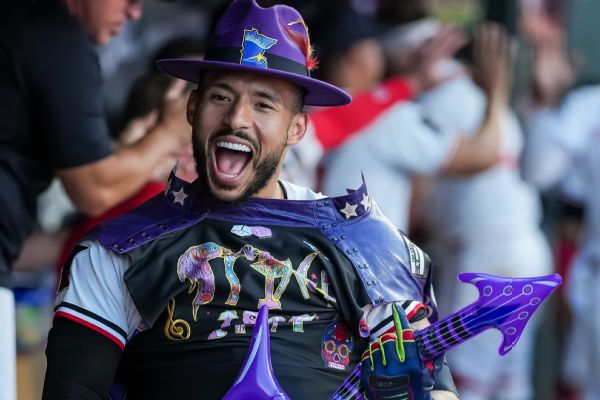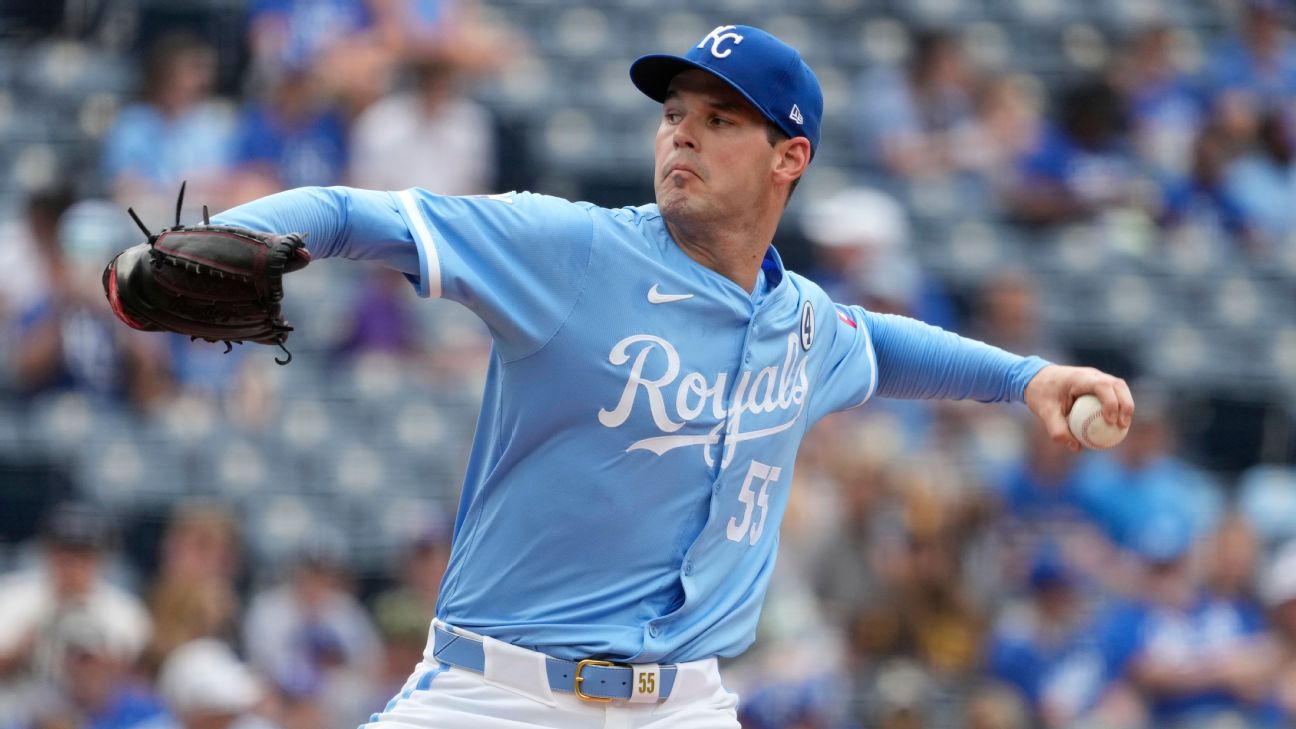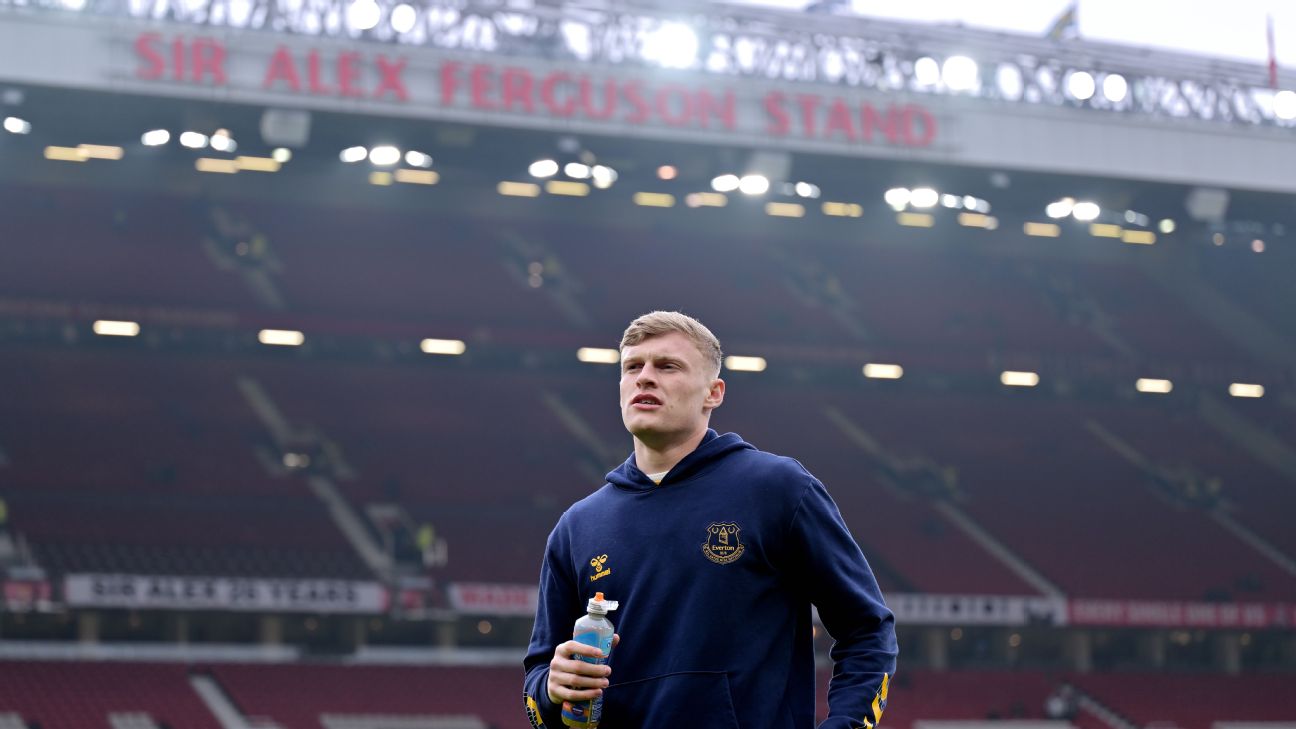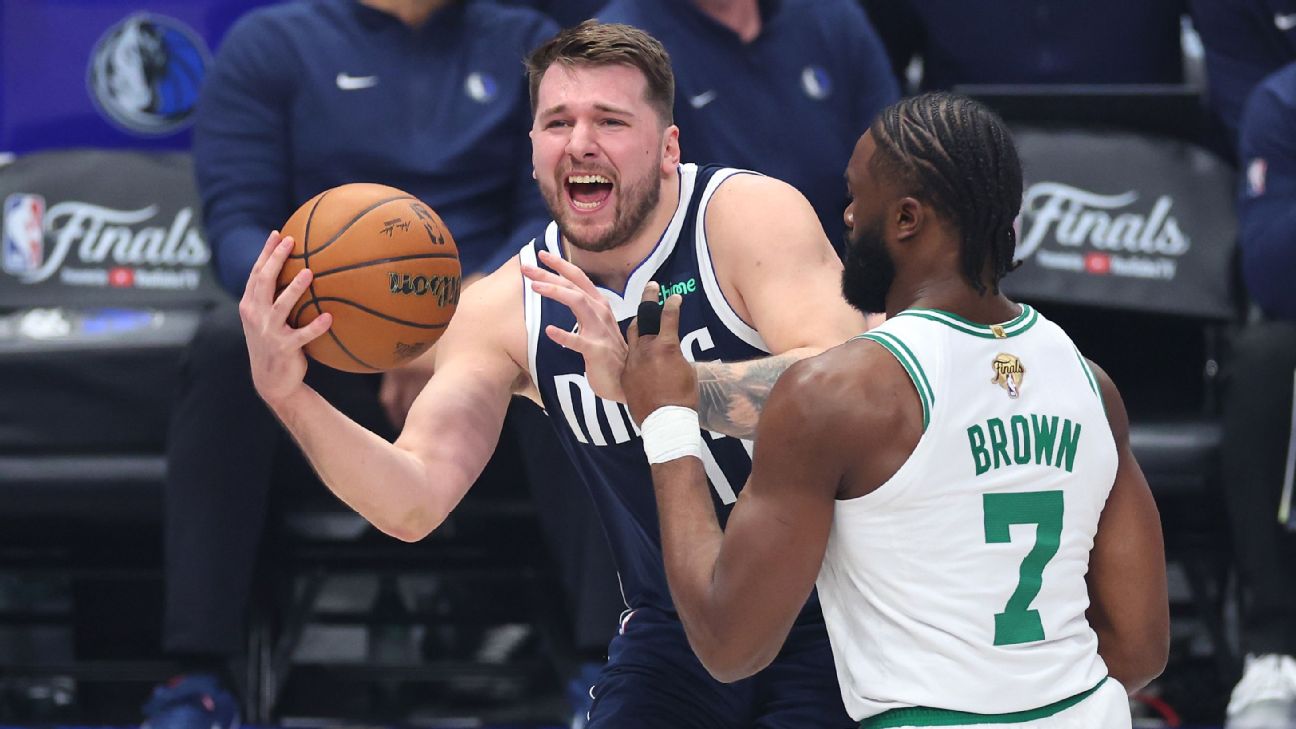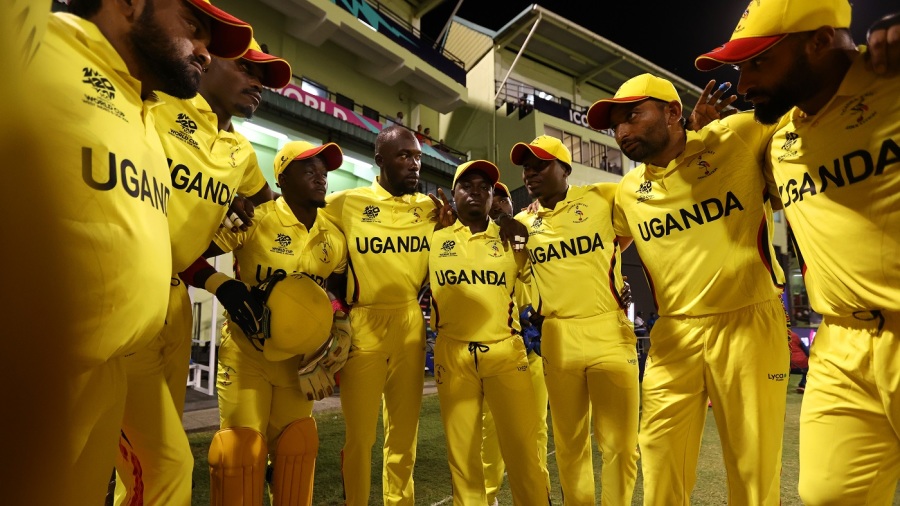![Martin Odegaard handball [1296x729]](https://a.espncdn.com/photo/2024/0523/r1336543_1296x729_16-9.jpg)
Messi to start Argentina s final Copa warmup
Not a week has gone by in the 2023-24 Premier League season without some kind of VAR controversy.
But which clubs got the worst of the VAR gaffes? Which teams actually benefited? And what difference would it have made to the Premier League table?
Now that the dust has settled on the season, ESPN can reveal the full list of the 31 VAR errors recorded by the Independent Key Match Incidents Panel, and we can rank which teams found themselves on the wrong side of a call the most -- and which teams benefited most. We've also looked at the data behind the referees to see who makes the fewest errors, both with and without taking VAR into consideration.
Revealed: Every official VAR mistake in the Premier League this seasonPlayers, managers and fans have moaned about VAR decisions all season. Yet for every club complaining, there's another delighted that the VAR got involved.
The Premier League's KMI Panel was set up two years ago to review every major decision in each match, but what does it actually do?
"It's made up of ex-players, ex-coaches -- people who'd actually played the game," the Premier League's chief football officer, Tony Scholes, said earlier this year. "The output of that analysis is used to help coach the referees, to help give PGMOL management a view as to where the game, as represented by these former players and coaches, doesn't agree with the approach that the referees are taking.
"It provides the transparency and independence of assessment of the accuracy of the referee's decision-making. The numbers used to be historically criticised by those of us from clubs, that it was referees marking their own homework. This is determined by the independent panel [rather than the referees themselves]."
Each club will doubtless have a long list of mistakes it feels have gone against its team, especially Wolves, who triggered a vote for VAR to be scrapped entirely ahead of next season. Yet the only official list of mistakes is the one created by the KMI Panel, which shared with ESPN the 31 decisions that were deemed to be incorrect. If an incident you are annoyed about isn't listed below, the panel said it was correct or not a clear and obvious error.
1. Aug. 14: Manchester United 1-0 Wolverhampton Wanderers Wolves should have been awarded a penalty in the sixth minute of stoppage time for a foul by André Onana on Sasa Kalajdzic.
2. Aug. 19: Liverpool 3-1 AFC Bournemouth A red card shown to Alexis Mac Allister in the 58th minute for a challenge on Ryan Christie should have been rescinded. Liverpool, who had the dismissal rescinded on appeal, were 2-1 up.
3. Sept. 2: Manchester City 4-1 Fulham Nathan Aké's goal should have been disallowed for a subjective offside against Manuel Akanji in first-half stoppage time. The score was 1-1 at the time.
4. Sept. 4: Arsenal 3-1 Man United Arsenal were awarded a penalty in the 60th minute for Aaron Wan-Bissaka's challenge on Kai Havertz. It was overturned by the referee at the monitor but should have stood. It was 1-1 at the time, though Arsenal went on to win 3-1.
5. Sept. 16: Aston Villa 3-1 Crystal Palace Villa were awarded a spot kick in the 93rd minute, which the VAR told the referee should be overturned. However, at the monitor Darren England rejected the advice and stuck with his decision. It was 1-1, and Villa went on to score twice in added time.
6. Sept. 18: Nottingham Forest 1-1 Burnley Lyle Foster had a goal disallowed in the 76th minute for deliberate handball in the buildup by Sander Berge. The score was 1-1.
7. and 8. Sept. 30: Aston Villa 6-1 Brighton & Hove Albion Two wrong decisions, both against Brighton. First, with the score 1-0, an Ollie Watkins goal should have been ruled out with Nicolò Zaniolo in front of the goalkeeper. Then the third goal from Watkins in the 26th minute should also have been chalked off for a foul by Douglas Luiz on Solly March.
9. Sept. 30: Tottenham Hotspur 2-1 Liverpool The most-infamous VAR error of them all. A communication error by Darren England led to Luis Díaz's goal remaining disallowed for offside. It was 0-0 at the time and Spurs scored their first goal a few minutes afterwards.
10. Oct. 1: Nottingham Forest 1-1 Brentford The score was goalless when Brentford should have been given a spot kick for a challenge by Matt Turner on Yoane Wissa.
11. Oct. 27: Crystal Palace 1-2 Tottenham Palace's stoppage-time consolation from Jordan Ayew was allowed to stand when it should have been ruled out for handball.
12. Oct. 28: Wolves 2-2 Newcastle United It was 1-0 to Wolves when Newcastle were awarded a penalty for Hwang Hee-Chan's challenge on Fabian Schär, which should have been overturned by the VAR.
13. Oct. 29: Brighton 1-1 Fulham João Palhinha should have been sent off in the 19th minute, with the score 0-0, for an elbow on Pascal Groß.
14, 15. Nov. 4: Newcastle 1-0 Arsenal Two red cards were missed, both when the score was 0-0. The first came in the 36th minute for Havertz's tackle on Sean Longstaff. The second was in the 45th minute for an elbow by Bruno Guimarães on Jorginho.
16. Nov 4: Sheffield United 2-1 Wolves Sheffield United were handed a penalty in the 97th minute for a foul by Fábio Silva on George Baldock, which should have been overturned. It resulted in the winning goal.
17. Dec. 9: Sheffield United 1-0 Brentford Brentford's Frank Onyeka should have been sent off for a challenge on Vinicius Souza in the 29th minute when the score was 0-0.
18. Dec. 10: Luton Town 1-2 Man City Jacob Brown should have been sent off for a challenge on Phil Foden. City were already 2-1 up in the 69th minute.
19. Dec. 23: Liverpool 1-1 Arsenal Liverpool were trailing 1-0 in the 19th minute when Martin Ødegaard should have conceded a penalty for handball.
20. Dec. 26: Burnley 0-2 Liverpool Darwin Núñez was wrongly penalised for a foul on Charlie Taylor before a Cody Gakpo goal with the score at 0-0. The VAR should have intervened to award it.
21. and 22. Feb 10: Luton 1-3 Sheffield United Two penalties were awarded for handball which should have been overturned. The first by Reece Burke of Luton (0-1, 33 minutes); the second by Vinicius Souza (0-2, 49 minutes).
23. Feb. 10: Nottingham Forest 2-3 Newcastle Forest should have been awarded a penalty for a challenge by Martin Dúbravka on Taiwo Awoniyi in the 62nd minute. The score was 2-2.
24. Feb. 17: Nottingham Forest 2-0 West Ham United Forest should have been given another spot kick when Maxwel Cornet fouled Neco Williams, it was in the 81st minute and the score was 1-0.
25. March 10: Brighton 1-0 Nottingham Forest In the 67th minute with the score 1-0, Jakub Moder should have been sent off for a challenge on Williams.
26. March 30: Chelsea 2-2 Burnley A penalty awarded to Chelsea for a challenge by Lorenz Assignon on Mykhailo Mudryk should have been overturned. The second yellow card shown to Assignon should also have been rescinded. The score was 0-0 at the time.
27. April 6: Everton 1-0 Burnley A red card shown to Dara O'Shea for denying obvious goal-scoring opportunity for a tackle on Dwight McNeil should have been reduced to a yellow.
28. April 7: Sheffield United 2-2 Chelsea Jack Robinson should have been sent off for a challenge on Cole Palmer in the 58th minute with the score 1-1.
29. April 21: Everton 2-0 Nottingham Forest Forest should have been given a spot kick for a challenge by Ashley Young on Callum Hudson-Odoi; it was 1-0 in the 55th minute.
30. May 11: Bournemouth 1-2 Brentford Bournemouth's Dominic Solanke had a goal disallowed on VAR review for a handball in the buildup by Antoine Semenyo. It was 0-0 in the 26th minute, with the KMI Panel saying the goal should have stood.
31. May 15: Brighton 1-2 Chelsea Brighton should have been awarded a penalty in the 46th minute for Malo Gusto's challenge on Simon Adingra. Chelsea led 1-0 when the incident happened.
How does this break down by club? Who has suffered the most errors?Wolves feature near the top -- but they are not at the summit. The worst-affected by VAR errors have been Brighton, Liverpool and Nottingham Forest, who each have four to their name.
As well as the Diaz goal, Liverpool should have had a penalty against Arsenal, a goal allowed against Burnley and Mac Allister's red card against Bournemouth cancelled.
Forest were denied three penalties -- against Newcastle, West Ham and Everton -- while Moder should have been dismissed for Brighton. Brighton also conceded two goals against Aston Villa which should have been ruled out, Palhinha should have been sent off for Fulham and they were denied a spot kick at home to Chelsea,
Still, Wolves were on the wrong end of three mistakes, and they are all spot kicks: the penalty they should have been given at Old Trafford, plus two wrongly awarded to Newcastle and Sheffield United.
Burnley also suffered three mistakes.
If clubs were adversely affected, others must have benefitted?Indeed. Aston Villa, Newcastle and Sheffield United each have three errors in their favor.
Villa had two of their decisions in the 6-1 win over Brighton, when two goals should have been disallowed. More importantly, they had a penalty which should have been overturned which led to stoppage-time goals in the win over Palace.
Newcastle escaped a penalty against Forest and should have had another reversed against Wolves, while Guimarães should have seen red vs. Arsenal.
Sheffield United were awarded two penalties incorrectly, and should have had a player sent off against Chelsea.
- How VAR decisions have affected every Prem club in 2023-24 - VAR in the Premier League: Ultimate guide
Who are the net winners and losers?This is about taking the total errors that have gone in a team's favor, and deducting those that have gone against a club. So, for example, Brentford have a score of +1: two errors that have benefitted them and one which went for the opposition.
Villa sit top on +3 as they've not suffered an error this season. Everton, Man United and West Ham are the only other clubs not to have a VAR mistake against them.
Only two clubs haven't have a VAR error go in their favor, and they sit at the bottom of the pile: Wolves on -3 and Liverpool the worst affected on -4.
What does this mean in terms of goals?Let's start by looking at the net score.
In a team's favor: goals awarded, and goals disallowed for the opposition.
Going against a team: goals disallowed, and leading to goals for the opposition.
Take the first, and deduct the second.
Fulham top the table for the most net goals gained, with two awarded and three disallowed for the opposition -- it gives them a net goals score of plus-5.
Man United and Wolves are worst affected, both with a score of -5 goals.
Chelsea have been awarded five goals across the season, with only one other club (Newcastle, three) given more than two.
Crystal Palace and Tottenham have the most goals conceded through VAR decisions, on four each.
When it comes to disallowed goals for teams, Aston Villa and Chelsea have both had six chalked off; with Man United on five, then West Ham and Wolves on four.
Villa might have a lot of disallowed goals affecting them, but that's offset by them also enjoying the most goals disallowed for the opposition. Seven goals have been ruled out for their opponents, no other clubs has seen more than four chalked off.
Okay, decisions are all well and good, but it's results that matterAbsolutely, the status of a match and how the VAR incident affected the future path of play is far more important than the basic numbers. For instance, two of the errors against Brighton came in one game when they were already losing.
We've drilled into all the key aspects -- time of the incident, form of the teams, status of the game, etc -- to assess what might have happened in a game if the VAR error hadn't happened.
Forest are the biggest losers, and have three additional points -- though they stay in 17th place. Most notable was the home game against Newcastle. They should have been awarded a penalty in the 62nd minute when the game was 2-2, and they went on to lose 3-2. There's every chance they win that game if they are awarded and covert the spot kick.
Despite all the headlines, Wolves would be just two points better off if the VAR hadn't made those three mistakes -- gaining one point each from draws against Man United and Sheffield United, and moving up a place into 14th.
But the biggest story comes from those teams who have benefitted the most. Villa lose two points after VAR errors are removed, and they drop out of the Champions League places into fifth, below Spurs. Both teams are now on 66 points; Villa's goal difference in the real table is +15 to Tottenham's +13, yet this flips around once the VAR errors are fixed and goals adjusted -- Spurs up to fourth with +16 and Villa on +9.
The biggest beneficiaries have been Newcastle -- losing three points after Forest get that penalty. And while Man United also gained two points because of errors, that extra point moves them above Newcastle into seventh and Erik ten Hag's men would be guaranteed European football next season -- either in the Europa League or the Europa Conference League, depending on the result of the FA Cup final.
Where are the VARs making errors?The stats show the biggest issue has been around penalties, with 14 of the 31 mistakes concerning spot kicks: 11 for a foul and three for handball. Eight should have been awarded that weren't, while six should have been overturned.
There's also a clear issue with red-card offences, as the VAR should have stepped in on nine occasions. That breaks down as five players who should have been sent off for serious foul play, with two others seeing red for violent conduct.
Two red cards should have been overturned: one for serious foul play, and the other for denying an obvious goal-scoring opportunity.
So, is VAR getting better year-on-year?This is the big question, and there's no doubt supporters would answer with a resounding "no."
Yet the results of the KMI Panel over the last two seasons suggest an improvement year on year.
The Panel is making judgements with both the laws and the intended interpretation of VAR in the Premier League as its base. For this reason, there will by many situations that don't get recorded as mistakes, either because they are supportable in law or because they don't reach the high threshold for a "clear and obvious error"; that undefinable subjective opinion which suggests a decision is wrong enough for the VAR to get involved.
There have been 31 VAR errors this season, compared to 38 in 2022-23; that's an improvement of 21.05%.
While missed interventions are around the same -- showing judging what is a clear and obvious error remains a difficult task -- it's the wrong interventions (when the VAR got involved but shouldn't have) which have more than halved.
Ok, we've talked about the errors, so where is VAR getting things right?The errors around VAR get all the headlines, but we have to remember that alongside those numbers there are many occasions when wrongs are being put right.
The Premier League says that accuracy is up from 82% pre-VAR to 96% post-VAR.
This season there were 112 VAR-related incidents, down from 120 last season and the all-time seasonal high of 128 in 2020-21.
Of the 112 times the VAR stepped in, 107 have been deemed to be correct (factoring in that the KMI Panel said the decision to overturn the Villa penalty would have been right). For all the negatives of VAR, it's a number that the clubs will look at when weighing up the pros and cons ahead of the vote forced by Wolves. Would brining back 107 errors be an acceptable course of action? Or is that a price worth paying to return football to its pre-VAR days?
How do teams fare over the five years of VAR?This table features the 13 teams who have been in the Premier League for all five seasons with the video assistant.
It will come as no surprise to Wolves fans that they have by far the worst numbers -- that's the total number VAR interventions in their favour, minus those that have gone against them.
Wolves have a net score of -18, that's 33 decisions against them, with 15 for them.
As these are overturns, it should tell us that there have been more incorrect refereeing decisions in Wolves games than in those involving any other team. However, these are just the basic numbers and don't take into account what was correct or incorrect, but that Arsenal and West Ham are the next worst on -6 -- some 12 decisions back -- shows why they as a club feel so hard done by.
Brighton fans will probably be surprised to see they are so far out in front at the top of the five-year table on +8, with Liverpool in second on +5 and Aston Villa and Man City on +4.
What about referee mistakes that weren't clear and obvious?This is a hidden stat you won't find anywhere else. ESPN has been able to compile the situations which the KMI Panel deemed to be a refereeing error, but not sufficient to be classed as "clear and obvious" for a VAR intervention.
Liverpool lead the way, and have benefitted from six errors that didn't reach the threshold. They include a penalty awarded against Bournemouth for a foul on Dominik Szoboszlai, a spot kick against Newcastle United when Diogo Jota went down under contact from goalkeeper Martin Dúbravka, and a second yellow card which should have been shown to Ibrahima Konaté vs. Everton.
Jurgen Klopp's men are way ahead of the rest, with a net score of +6 decisions; Sheffield United and Tottenham coming next on +3.
At the other end of the scale, it's Burnley who have been most affected with six refereeing errors, in addition to the three VAR mistakes.
Burnley conceded a late equaliser at home to Luton when Elijah Adebayo bumped into goalkeeper James Trafford. The Panel agreed that there wasn't enough in it for the VAR to disallow the goal, but referee Tony Harrington and his team should have acted. The Clarets should also have been awarded penalties against Newcastle and West Ham, and a late match-winning spot kick shouldn't have been given to Aston Villa for minimal contact.
At least Wolves fare much better in this sphere, with a score of +1.
Ok, we've done the decisions, what about the referees?Apart from the numbers, one thing stands out above all else: there's no Anthony Taylor in this list. And it's not just because of the minimum 10 games qualification.
Taylor is the only one of the 20 Select Group 1 referees who hasn't acted as a VAR in the Premier League all season. Not only that, he hasn't been in the Stockley Park hotseat since being the video referee for Newcastle vs. West Bromwich Albion in December 2020 -- 3½ years ago. ESPN has been told that this is due to the different skillsets referees have, yet for Taylor to be the only one in this position really sticks out.
He has taken on VAR duties in the FA Cup, with appointments handled by the Football Association. He was lead VAR in the fifth round for Wolves vs. Brighton, and support VAR in the third round for Man City vs. Huddersfield.
Taylor refereed 27 games with no VAR appointments, while Michael Oliver was the referee 24 times, and also took on 26 VAR appointments. Taylor would take on a greater number of fourth-official duties.
The bulk of the VAR work is performed by a smaller number of the Select Group officials, with 11 of them taking on 20+ appointments, and seven of those in the hub for 30+ matches.
Michael Salisbury, who was promoted to the Premier League roster in 2021, has hugely VAR impressive stats, with just one error across 35 games. Remarkably, that was in the first gameweek of the season when he failed to award the penalty to Wolves at Man United -- since then his record has been flawless.
Peter Bankes would have been joint with Salisbury but for his failure to give a penalty to Brighton against Chelsea on May 15; that was only his second mistake after also failing to intervene on the red card for Fulham's Palhinha -- coincidentally also at Brighton, and on both occasions the match referee was Salisbury.
John Brooks isn't far behind, with one mistake across 33 matches. His only error was to not intervene to cancel Chelsea's penalty against Burnley in March.
At the other end of the table the stats don't look so good for Stuart Attwell, who will be at Euro 2024 as a VAR, and Paul Tierney, who each have four errors to their name.
Attwell has failed to disallow three goals, and was the VAR who failed to give a spot kick to Forest at Everton. Tierney didn't intervene on Mac Allister's red card against Bournemouth, and should have sent off Jack Robinson against Chelsea. He also wrongly advised two penalties in Luton vs. Sheffield United.
Which VARs are most likely to send a referee to the monitor?It's those subjective decisions which require the VAR to tell the referee they have made a mistake and send them to the pitchside monitor.
The numbers may tell us that Attwell is more reluctant to do it over other referees, as he has the lowest frequency of subjective overturns -- and that's despite being in the video assistant's chair 30 times.
Attwell utilised the monitor only three times -- and the third came on the final day when he sent Michael Oliver to the screen to disallow Arsenal's winner ... and Oliver snubbed it. The only subjective overturns were to give a penalty to Man City against Wolves on May 4 and a 90th-minute spot kick to Fulham vs. Wolves on Nov. 11.
Oliver (seven) and Jarred Gillett (eight) are most prolific at sending the referee to the screen.
Which referees get their decisions changed most often?Considering Craig Pawson has taken charge of 19 games and had eight trips to the monitor, that seems to be a significant number and it's most of any referee -- though Tony Harrington and Michael Salisbury have refereed fewer matches.
Salisbury, who we've seen has impressive numbers as a VAR, doesn't fare anywhere near as well when it comes to being the referee, with six decisions changed. Harrington has the worst frequency, with a subjective overturn every other game from his 10 matches.
At the other end of the table, Peter Bankes and Thomas Bramall haven't been to the monitor once. However, Bramall should have been sent to overturn Mac Allister's red card against Bournemouth, and to give a penalty to Forest against West Ham. But Bankes has a completely clean record from his 10 matches.
Of those to referee more regularly, Simon Hooper does significantly well, with only one missed intervention on top of the two overturns recorded. Michael Oliver and Paul Tierney both have had two trips to the monitor, plus two that were missed.
In terms of frequency of errors to games refereed, David Coote leads the table with one error -- there are no missed interventions to his name on top of that.
Okay, how do referees fare when all mistakes are taken into account?Now we're taking everything into account: the VAR overturns, the missed interventions, the mistakes that were not classed as clear and obvious, and missed/incorrect second yellow cards.
It gives us the complete overview of a referee's performance in the Premier League this season.
Simon Hooper has proven to be the best referee, with only three recorded errors of any kind across his 25 games: two decisions which were overturned through VAR, and one error which the VAR didn't pick up. He has no general mistakes to his name.
Closely following is John Brooks, with three errors (all fixed by the VAR) across 22 matches.
Sam Barrott's appearance in third place is particularly notable, considering he was only added to the Premier League rotation in October and appears to have a very bright future.
Top-level referees Michael Oliver and Anthony Taylor are midtable with similar records.
At the bottom of the table is Michael Salisbury, who as the referee has more than one error a game: six decisions changed by the VAR, three which should have been fixed, five mistakes which weren't clear and obvious one incorrect second yellow card.
Stuart Attwell and Craig Pawson also have poor numbers, considering their level of experience.






